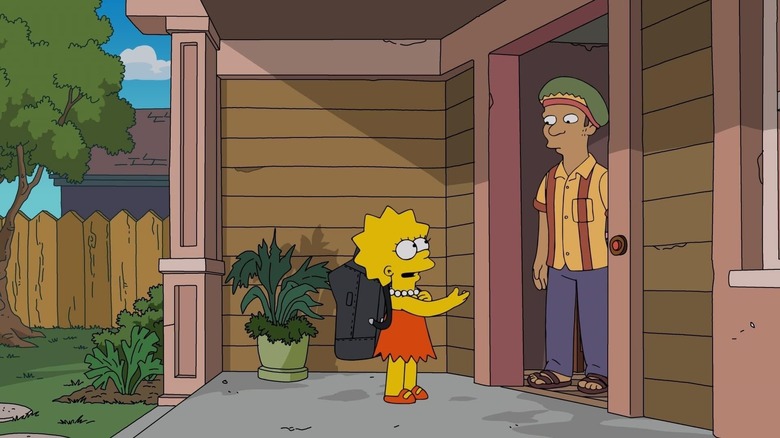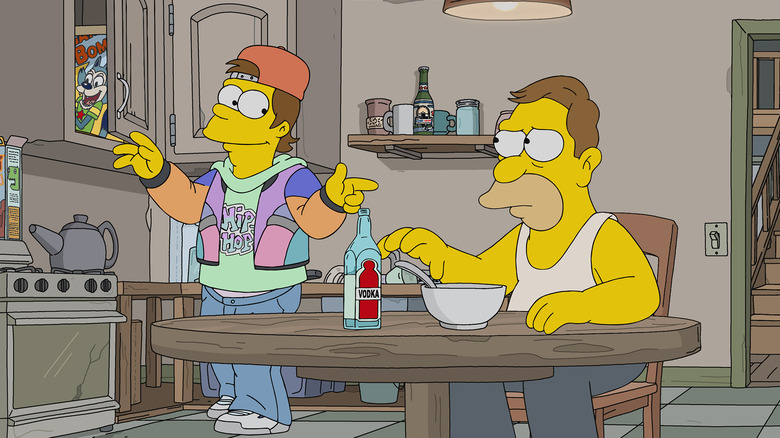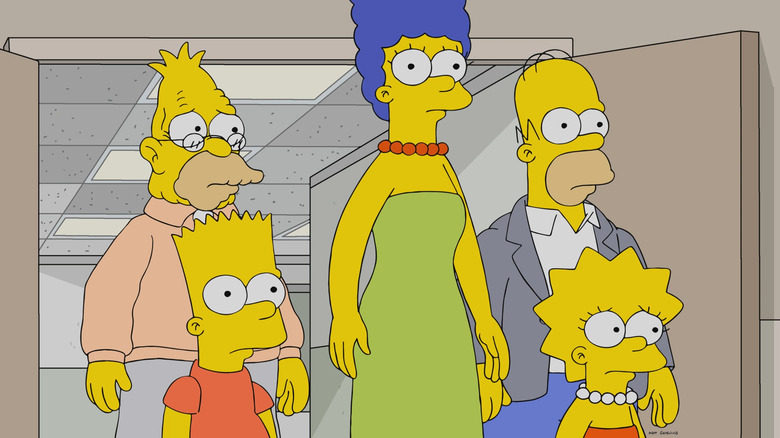
If you think too much about time while watching the later episodes of "The Simpsons," you'll go insane. A recent season 33 episode has Lisa talking to the ghost of Bleeding Gums Murphy (now voiced by Kevin Michael Richardson). Bleeding Gums tells Lisa to search a name up in the phone book, to which Lisa responds, "What's a phone book?" Bleeding Gums remarks to himself, "I have been dead a long time."
At first glance, it's a fun little joke pointing out how irrelevant phone books are in this day and age, but it also forces us to wonder how time works in this universe. Bleeding Gums is acknowledging that it's been a long time since he's died, and yet he never wonders why Lisa is the same age as she was twenty-seven years ago. When he first met Lisa back in 1990 (thirty-two years ago), she would've definitely known what a phone book was. Lisa spends the episode trying to connect with Bleeding Gums' adult son, a person who was born sometime in the late '80s/early '90s and has since grown into an adult. Why has this guy aged while Lisa hasn't? Why isn't Lisa asking questions?
The answer is obvious: the format of "The Simpsons" makes it so the characters can't age even as times change. Bart can enjoy multiple summer vacations over the course of the series, but he never actually gets to leave the fourth grade. "The Sound of Bleeding Gums" isn't unique in its adherence to these rules, but it is unique in just how much it rubs our faces in the nonsensical way time works on this show. Lisa spends half the episode talking to an adult man who's technically younger than her, and no one thinks it's weird.
This approach to continuity may seem nonsensical, but there actually is one rule the writers stick to when it comes to canon. But we'll get to that in a minute.
Time Changes Canon, Which Drives Fans Crazy

One of the most famous examples of "The Simpsons" messing around with time is the season 19 episode, "That '90s Episode," which changed the original story of Homer and Marge's relationship. In the early seasons, it was established that Home and Marge met in high school in the '70s, and that Bart and Lisa were born in the '80s. But in 2008, that backstory no longer made sense.
So, the writers created a new backstory where Homer and Marge don't get married until the late '90s, and fans didn't love it. "It insulted lifelong Simpsons fans everywhere," said one critic the night the episode aired. He argued that the episode was "thumbing its nose at all the great, established, hilarious moments and episodes we've come to love and cherish."
Unfortunately for disgruntled fans in 2008, this wouldn't be the end of the show switching up the established timeline. The season 32 episode "Do Pizza Bots Dream of Electric Guitars" featured a flashback to Homer as a teenager in the late '90s, which meant that he was the same age as Bart would've been at the time if Bart aged normally from 1989 onward. This time around, "The Simpsons" co-showrunner Matt Selmon addressed the controversy ahead of time, tweeting: "Continuity Alert: Sunday's @TheSimpsons playfully re-interprets the show's timeline to allow Homer to be a teenager in the early '90s — The Simpsons is a 32-year-old series where the characters do not age, so the 'canon' must be elastic/contradictory/silly."
He also clarified that the episode wasn't intended to erase any other beloved episodes of the show: "There is no @TheSimpsons 'canon' or 'non-canon.' There are only stories. If all these crazy things really happened to one family the characters would be in a mental hospital." But as mentioned above, there is something the writers keep in mind. So let's get to it.
The Only Part Of The Canon That Matters

Since it's long been established that time is not a concrete thing in the Simpsons universe, one wonders if there's anything on the show that is concrete. Matt Selmon has an easy answer: the characters. As he put it in a recent interview:
"The characters themselves don't change. Like who they are, what they want, what matters to them, what they're scared of, what they're proud of, who they love, what their flaws, their strengths. You can't mess with that."
Homer will always be lazy and short-sighted, Marge will always be a loving and worrying housewife, Bart will always be a troublemaker, and Lisa will always be smart and passionate about her beliefs. (And Maggie will always be a baby.) It doesn't matter what year it is; these basic parts of their characters will always be the same. You can put these characters into any situation at any point in time, and it wouldn't be too hard to predict how they'd act.
As of the latest season, "The Simpsons" has aired 728 episodes. It's nowhere near as relevant a show as it was in its heyday, but it's still doing good enough ratings-wise that it doesn't seem like Fox will ever let it die. Even as the voice actress for Mrs. Krabappel passes away, the strain of Julie Kavner's Marge voice grows increasingly severe, the decades-long musical composer is fired, and as the jokes stop being all that funny, the show still goes strong. "The Simpsons" has weathered through it all because the main characters we know and love are still there. They're the only canon that truly matters, and the writers have always kept that in mind.
Read this next: The 13 Best Comedy Shows On Amazon Prime Right Now
The post Only One Part Of The Simpsons Canon Really Matters To The Writers appeared first on /Film.
0 Commentaires